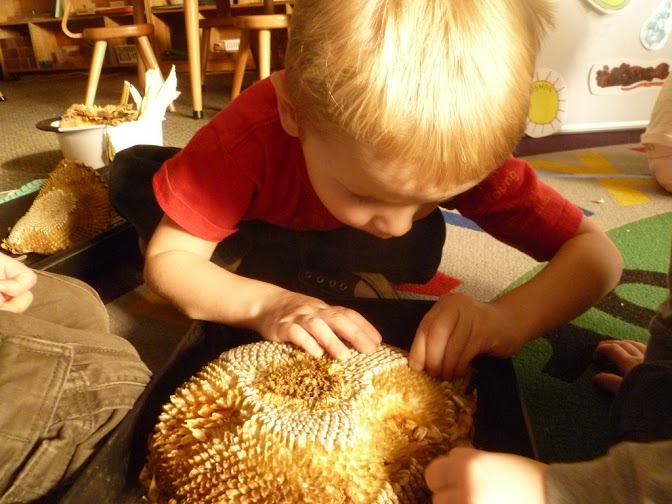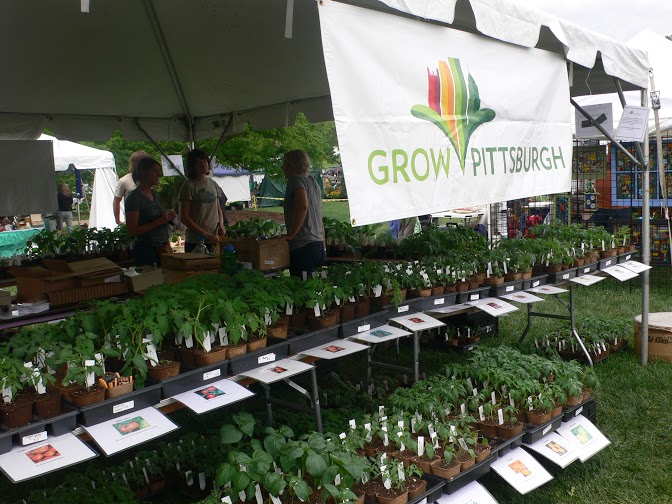Check in weekly, on Wednesdays, to read our new post on gardening, harvesting, and making use of that fine, extra-local produce! We’ll share tips and techniques, gleaned from our urban farms and gardens. Email info@growpittsburgh.org with any topics you’d like us to cover.
Big change is afoot here at Grow Pittsburgh! We’ve always carefully selected the seeds for our gardens and seedling sales. But now we’re taking our seed selection process one step further in order to completely avoid seedlings associated with agrochemical and agricultural biotechnology giant, Monsanto.
Our growers go through many steps to ensure great seedlings and predictable garden yields. We purchase seed varieties that we expect to perform well in tough conditions; the urban environment can be hotter, drier, and the soil quality is generally not as good as in rural areas. We need the crops we plant to be productive and disease resistant, so our community gardeners, schoolchildren, and farm stand customers have a consistent supply of fresh, beautiful produce.
We also select seed according to national organic standards, which dictate that organic seed must be chosen if it is available. Also according to organic standards, Grow Pittsburgh does not plant genetically modified (GM) seed. GM seeds would have little to no benefit on the scale that we are farming. But there are larger concerns with genetically modified organisms (GMOs).
In fact, GM crops have many troubling aspects.
- The majority of GM crops – and the herbicides used to grow them – are owned by one enormous corporation: Monsanto.
- There has been inadequate research proving the long-term safety of GM crops.
- Farms that plant GM crops become dependent on spraying increasingly higher levels of herbicide, which finds its way into drinking water and processed foods, as well as destroying native plants that would harbor beneficial insects. For instance, the decline of monarch butterflies is linked to the lack of native milkweed family plants – the species’ only food – due to excessive spraying of herbicides.
- Genetically engineered crops have not been proven to produce more than traditional crops.
- GM crops are expensive when compared with comparable non-GM crops, and they are patented. A farmer is prohibited by law from saving their own seeds, whether they are left over from the planting season or derived from the crops themselves.
- “Genetic drift” commonly occurs, as GM crops spread their genetic information through pollination with non-GM crops. Farmers with all intentions of avoiding GM crops have been successfully sued by Monsanto for genetic information found in their crops due to wind pollination from GM fields.
Based on our vision of envisioning the day where everyone in our city and region grows and eats fresh, local, and healthy food, we cannot support the proliferation of costly seed that requires excessive inputs and may harm human health.
For this reason, we have made a decision as an organization to avoid purchasing and planting seeds connected directly or indirectly to Monsanto. Monsanto, the corporation that develops and owns more GM seeds than any other, also owns the rights to many common and reliable non-GM crop varieties. So it’s with mixed feelings that we let go some of our favorite seeds, in order to cut all ties – no matter how indirect – with Monsanto.
It can be very difficult to determine which seeds are connected to Monsanto, as their vegetable seeds are sourced through subsidiaries, De Ruiter and Seminis. Many seed companies we work with have stopped sourcing from any Monsanto-connected company, but some still carry a few seeds from these subsidiary companies. After lots of online research and emails to seed companies, we’ve worked out which of our seed varieties are connected in any way to Monsanto. It’s not a long list, but some of the varieties are hard to give up!
Through all of our research, we’ve learned a few tips to pass along to you. If you’re interested in avoiding GM crops or crops associated with Monsanto, there are a few steps you can take.
- First of all, check to see if the seed company you’re using has signed the Safe Seed Pledge. This statement indicates that the seed company will not knowingly sell any genetically modified seed.
- Some seed companies, like High Mowing Seeds and Fedco, go beyond the Safe Seed Pledge and refuse to purchase seeds from Monsanto or any of its subsidiaries. These companies often have clear statements on their websites.
- If you want to avoid all Monsanto companies and can’t find information about a seed company’s suppliers, a quick email or call to the company can help get you the info you need. Companies that carry seeds from a Monsanto-owned company will be able to give you a list of what varieties this includes.
- If you’d like to determine whether a particular variety is owned by Monsanto, you can do a search on the Seminis and De Ruiter websites.
- If you are simply concerned with avoiding genetically modified seeds, you can opt for certified organic seed, as organic standards do not allow for genetic modification.
For more information about genetic modification, which types of crops may be genetically modified, and how GMOs compare with conventional crops, check out some resources we’ve found helpful:
- Rodale Farming Systems 30-Year Trial (organic vs conventional agricultural fields planted side by side)
- Consumer Reports: Where GMOs hide in Food
- The Non-GMO Project
So what will the changes at Grow Pittsburgh entail? You may not notice much of a change in our gardens, as we trial new varieties but still provide similar types of crops as previous years. But our seedling offerings will look a little different than in the past. Look for “Sungold” to replace “Sunsugar,” cherry tomatoes, “Earliana” to replace “Early Girl” early red tomatoes, and “Feherozone” to replace “Sweet Banana,” along with a few others. We’re excited to make this positive change and hear your feedback about the new produce and seedling varieties. Thanks for working with us to find some new favorites!


